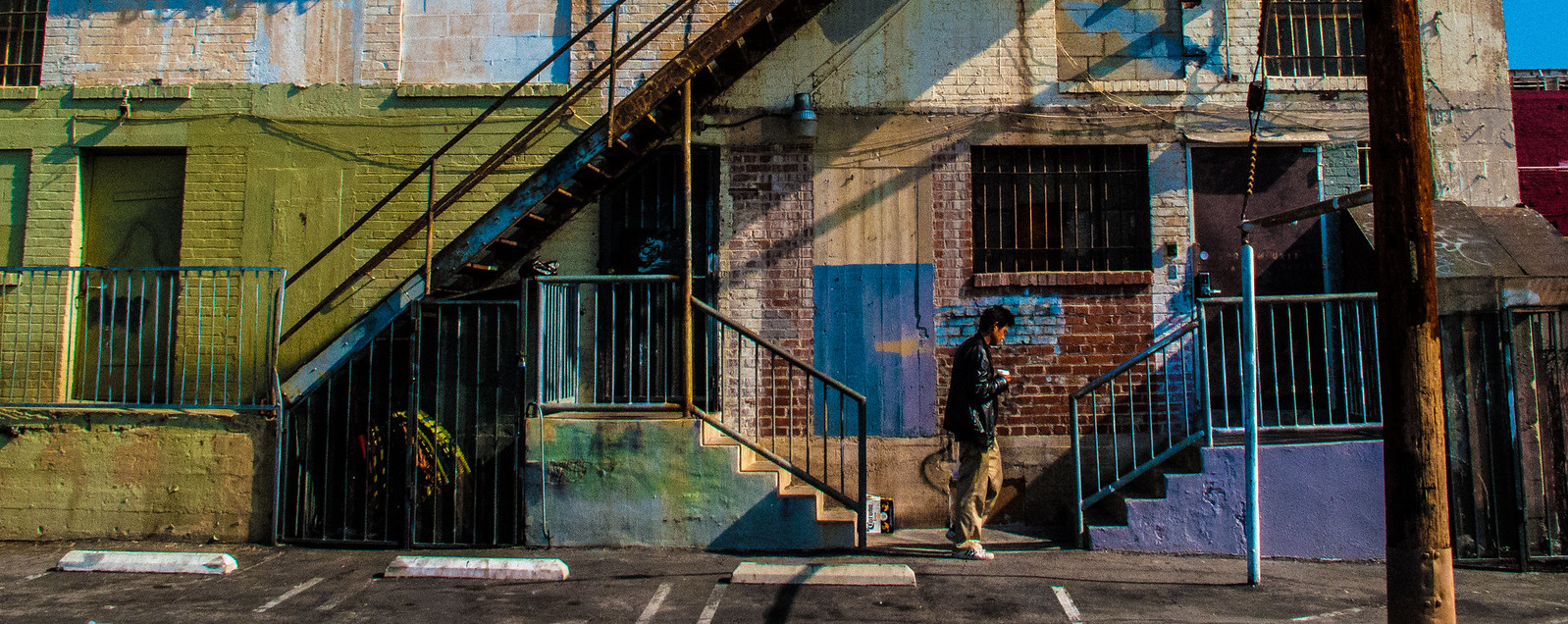.

Mis-Match (Hollywood, California): photo by michaelj1998, 21 April 2014
Whatever else may be wrong in a political way -- like the inadequacy of the Great Depression techniques applied to a scene that has long outgrown them; like old-fashioned grafter's glee among the city fathers over the vast amounts of poverty-war bread that Uncle is now making available to them -- lying much closer to the heart of L.A.'s racial sickness is the co-existence of two very different cultures: one white and one black.
While the white culture is concerned with various forms of systematized folly -- the economy of the area in fact depending on it -- the black culture is stuck pretty much with basic realities like disease, like failure, violence and death, which the whites have mostly chosen -- and can afford -- to ignore. The two cultures do not understand each other, though white values are displayed without let-up on black people's TV screens, and though the panoramic sense of black impoverishment is hard to miss from atop the Harbor Freeway, which so many whites must drive at least twice every working day. Somehow it occurs to very few of them to leave at the Imperial Highway exit for a change, go east instead of west only a few blocks, and take a look at Watts. A quick look. The simplest kind of beginning. But Watts is country which lies, psychologically, uncounted miles further than most whites seem at present willing to travel.
.
As for violence, in a pocket of reality such as Watts, violence is never far from you: because you are a man, because you have been put down, because for every action there is an equal and opposite reaction. Somehow, sometime. Yet to these innocent, optimistic child-bureaucrats, violence is an evil and an illness, possibly because it threatens property and status they cannot help cherishing.
They remember last August's riot as an outburst, a seizure. Yet what, from the realistic viewpoint of Watts, was so abnormal? "Man's got his foot on your neck," said one guy who was there, "sooner or later you going to stop asking him to take it off." The violence it took to get that foot to ease up even the little it did was no surprise. Many had predicted it. Once it got going, its basic objective -- to beat the Black and White police -- seemed a reasonable one, and was gained the minute The Man had to send troops in. Everybody seems to have known it. There is hardly a person in Watts now who finds it painful to talk about, or who regrets that it happened -- unless he lost somebody.
But in the white culture outside, in that creepy world full of pre-cardiac Mustang drivers who scream insults at one another only when the windows are up; of large corporations where Niceguymanship is the standing order regardless of whose executive back one may be endeavoring to stab; of an enormous priest caste of shrinks who counsel moderation and compromise as the answer to all forms of hassle; among so much well-behaved unreality, it is next to impossible to understand how Watts may truly feel about violence. In terms of strict reality, violence may be a means to getting money, for example, no more dishonest than collecting exorbitant carrying charges from a customer on relief, as white merchants here still do. Far from a sickness, violence may be an attempt to communicate, or to be who you really are.
Thomas Pynchon: from A Journey into the Mind of Watts, in New York Times Magazine, 12 June 1966




4 comments:
L.A. Unconfidential
So many dried-up dreams... so many imploded souls in Los Angeles; the failure of the American urban. Too... there's the odd 80-year-old billionaire sports fop in faux philosophic contest with his 20-year-old girlfriend (tape recorded for self-righteous indulgence) and the wife of 60-years (no amount of plastic surgery can help now)... and suits and lawyers and a sports franchise worth half a billion.... But, yes, we have these photographs, thanks to you, Tom, and we can just about hear sobbing.
incredible and even enlightening juxtaposition of text and photos, despite having known it, personally and generally, for what seems ever....
"Far from a sickness, violence may be an attempt to communicate, or to be who you really are".
This is true of nation states also.
"So much well-behaved unreality"
More and more of us can have a taste of that unreality, as the social media reduces feeling to a manageable number of signs.
Two critical responses in two different media. Brilliant stuff.
Post a Comment